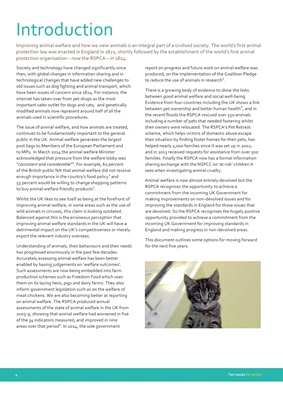
4 Ten issues for action
Improving animal welfare and how we view animals is an integral part of a civilised society. The world's first animal
protection law was enacted in England in 1822, shortly followed by the establishment of the world's first animal
protection organisation - now the RSPCA - in 1824.
Introduction
Society and technology have changed significantly since
then, with global changes in information sharing and in
technological changes that have added new challenges to
old issues such as dog fighting and animal transport, which
have been issues of concern since 1824. For instance, the
internet has taken over from pet shops as the most
important sales outlet for dogs and cats, and genetically
modified animals now represent around half of all the
animals used in scientific procedures.
The issue of animal welfare, and how animals are treated,
continues to be fundamentally important to the general
public in the UK. Animal welfare generates the largest
post bags to Members of the European Parliament and
to MPs; in March 2014 the animal welfare Minister
acknowledged that pressure from the welfare lobby was
"consistent and considerable"1. For example, 62 percent
of the British public felt that animal welfare did not receive
enough importance in the country's food policy2 and
55 percent would be willing to change shopping patterns
to buy animal welfare friendly products3
.
Whilst the UK likes to see itself as being at the forefront of
improving animal welfare, in some areas such as the use of
wild animals in circuses, this claim is looking outdated.
Balanced against this is the erroneous perception that
improving animal welfare standards in the UK will have a
detrimental impact on the UK's competitiveness or merely
export the relevant industry overseas.
Understanding of animals, their behaviours and their needs
has progressed enormously in the past few decades.
Accurately assessing animal welfare has been better
enabled by basing judgements on 'welfare outcomes'.
Such assessments are now being embedded into farm
production schemes such as Freedom Food which uses
them on its laying hens, pigs and dairy farms. They also
inform government legislation such as on the welfare of
meat chickens. We are also becoming better at reporting
on animal welfare. The RSPCA produced annual
assessments of the state of animal welfare in the UK from
2005-9, showing that animal welfare had worsened in five
of the 34 indicators measured, and improved in nine
areas over that period
4. In 2014, the sole government
report on progress and future work on animal welfare was
produced, on the implementation of the Coalition Pledge
to reduce the use of animals in research5.
There is a growing body of evidence to show the links
between good animal welfare and social well-being.
Evidence from four countries including the UK shows a link
between pet ownership and better human health6
, and in
the recent floods the RSPCA rescued over 550 animals
including a number of pets that needed fostering whilst
their owners were relocated. The RSPCA's Pet Retreat
scheme, which helps victims of domestic abuse escape
their situation by finding foster homes for their pets, has
helped nearly 1,000 families since it was set up in 2002,
and in 2013 received requests for assistance from over 500
families. Finally the RSPCA now has a formal information
sharing exchange with the NSPCC on 'at risk' children it
sees when investigating animal cruelty.
Animal welfare is now almost entirely devolved but the
RSPCA recognises the opportunity to achieve a
commitment from the incoming UK Government for
making improvements on non-devolved issues and for
improving the standards in England for those issues that
are devolved. So the RSPCA recognises the hugely positive
opportunity provided to achieve a commitment from the
incoming UK Government for improving standards in
England and making progress in non-devolved areas.
This document outlines some options for moving forward
for the next five years.